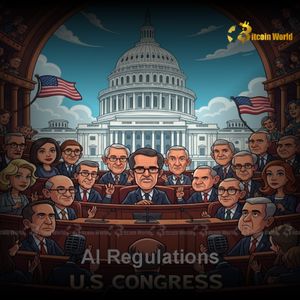AI Regulation: Congress’s Alarming Push to Block State AI Laws for Five Years
7 min read
BitcoinWorld AI Regulation: Congress’s Alarming Push to Block State AI Laws for Five Years In the rapidly evolving digital landscape, where decentralized technologies like cryptocurrency thrive on innovation, a significant debate is unfolding in Washington that could reshape the future of artificial intelligence. Congress is currently deliberating a federal proposal to impose an AI moratorium , potentially banning states and local governments from regulating AI for five years. This move, reminiscent of debates around digital asset regulation, has sparked intense discussion among tech leaders, policymakers, and consumer advocates alike. The Proposed AI Moratorium : What’s on the Table? A federal proposal that would prohibit states and local governments from regulating AI for half a decade could soon become law. Senator Ted Cruz (R-TX) and other lawmakers are working to include this provision in a major GOP budget bill, which the Senate is voting on this Monday, ahead of a critical July 4 deadline. This measure, initially conceived to ban states from enforcing any laws or regulations on AI models, systems, or automated decision systems for a decade, has seen revisions. Over the weekend, Senator Cruz and Senator Marsha Blackburn (R-TN) agreed to shorten the pause on state-based AI regulation to five years. The updated language attempts to exempt laws addressing child sexual abuse materials, children’s online safety, and an individual’s rights to their name, likeness, voice, and image. However, a crucial caveat states that such laws must not place an “undue or disproportionate burden” on AI systems. Legal experts are uncertain how this would impact existing or future state AI laws , creating a cloud of ambiguity over their enforceability. Fueling AI Innovation or Stifling Progress? Proponents of the federal AI moratorium, including prominent figures like OpenAI’s Sam Altman, Anduril’s Palmer Luckey, and a16z’s Marc Andreessen, argue that a fragmented approach to AI regulation across states would hinder American AI innovation . They contend that a “patchwork” of diverse state laws would make it excessively difficult for AI companies to operate and scale, especially at a time when the global race to dominate AI, particularly against China, is intensifying. The argument is that a unified federal approach, even if it means a temporary pause on state action, would provide the necessary clarity and freedom for AI developers to innovate rapidly without navigating a labyrinth of differing local rules. This perspective emphasizes speed and competitiveness on the international stage as paramount. Safeguarding Consumer Protection : The Case Against Federal Preemption Critics of the proposed moratorium argue that it would severely undermine consumer protection and accountability in the rapidly evolving AI landscape. This group includes most Democrats, many Republicans, Anthropic’s CEO Dario Amodei, labor groups, AI safety nonprofits, and consumer rights advocates. They warn that this provision would block states from passing vital laws designed to protect citizens from AI harms, effectively allowing powerful AI firms to operate with minimal oversight. The moratorium threatens to preempt state AI laws that have already been enacted. For example, California’s AB 2013 requires companies to disclose the data used to train AI systems, offering transparency to consumers. Similarly, Tennessee’s ELVIS Act protects musicians and creators from AI-generated impersonations, a direct response to emerging AI harms. Public Citizen has compiled a database revealing numerous AI-related laws across states that could be nullified, many of which address specific harms like deceptive AI-generated media used to influence elections, a concern shared by states like Alabama, Arizona, California, Delaware, Hawaii, Indiana, Montana, and Texas. Furthermore, several noteworthy AI safety bills awaiting signature, such as New York’s RAISE Act, which would mandate large AI labs nationwide to publish thorough safety reports, are also at risk. Opponents argue that allowing a federal vacuum in regulation for five years leaves consumers vulnerable to unchecked AI development. The Fiscal Leverage: How Funding Ties Into State AI Laws Getting the AI moratorium into a budget bill has required some creative legislative maneuvering. Budget bill provisions typically need a direct fiscal impact. To meet this requirement, Senator Cruz revised the proposal in June to make compliance with the AI moratorium a condition for states to receive funds from the $42 billion Broadband Equity Access and Deployment (BEAD) program. This strategic move leverages federal funding as an incentive for states to adhere to the federal AI pause. Cruz released another revision last week, claiming it ties the requirement only to a new $500 million in BEAD funding included in the bill—a separate, additional pot of money. However, a closer examination of the revised text suggests the language also threatens to pull already obligated broadband funding from states that do not comply. Senator Maria Cantwell (D-WA) previously criticized Cruz’s original language, stating it “forces states receiving BEAD funding to choose between expanding broadband or protecting consumers from AI harms for ten years.” This fiscal pressure adds another layer of complexity to the debate. What’s Next for AI Regulation in Congress? As of Monday, the Senate is engaged in a “vote-a-rama”—a series of rapid votes on the budget bill’s numerous amendments. The new language agreed upon by Cruz and Blackburn will be part of a broader amendment that Republicans are expected to pass along party lines. Senators will also likely vote on a Democrat-backed amendment aimed at stripping the entire AI moratorium section from the bill. The outcome of these votes will determine the immediate future of AI regulation in the U.S. The debate extends beyond Capitol Hill. Chris Lehane, chief global affairs officer at OpenAI, stated that the “current patchwork approach to regulating AI isn’t working and will continue to worsen if we stay on this path.” He warned of “serious implications” for the U.S. in the AI dominance race against China, even quoting Vladimir Putin on the importance of AI leadership. OpenAI CEO Sam Altman echoed these sentiments, expressing concern that a state-by-state patchwork would be “a real mess and very difficult to offer services under.” Altman also questioned whether policymakers could keep pace with rapidly evolving AI technology to craft effective regulations. The Public’s Stance on Consumer Protection While proponents of the moratorium advocate for a “light touch” approach to AI governance, public sentiment appears to lean differently. A recent Pew Research survey found that most Americans desire more AI regulation . Approximately 60% of U.S. adults and 56% of AI experts are more concerned that the U.S. government won’t go far enough in regulating AI than they are about over-regulation. Americans also largely lack confidence in the government’s ability to regulate AI effectively and remain skeptical of industry efforts around responsible AI. This public desire for stronger oversight stands in contrast to the proposed federal pause on state action. The Case Against Preemption: Why States Matter “The patchwork argument is something that we have heard since the beginning of consumer advocacy time,” Emily Peterson-Cassin, corporate power director at internet activist group Demand Progress, told Bitcoin World. “But the fact is that companies comply with different state regulations all the time. The most powerful companies in the world? Yes. Yes, you can.” This counter-argument suggests that large tech companies are well-equipped to navigate varying state laws, as they do in other industries. Opponents and cynics argue that the AI moratorium is less about fostering innovation and more about sidestepping oversight. While many states have passed AI regulations, Congress, known for its slow pace, has yet to pass any comprehensive federal AI laws. “If the federal government wants to pass strong AI safety legislation, and then preempt the states’ ability to do that, I’d be the first to be very excited about that,” said Nathan Calvin, VP of state affairs at the nonprofit Encode. “Instead, [the AI moratorium] takes away all leverage, and any ability, to force AI companies to come to the negotiating table.” Anthropic CEO Dario Amodei, a vocal critic, stated in an opinion piece for The New York Times that “a 10-year moratorium is far too blunt an instrument.” He emphasized AI’s rapid advancement, predicting fundamental changes within two years. Amodei argued that without a clear federal plan, a moratorium would result in the worst outcome: no state action and no national policy. He suggested that instead of prescribing product release methods, the government should collaborate with AI companies to establish transparency standards for practices and model capabilities. The opposition isn’t limited to Democrats. Republicans like Senator Josh Hawley (R-MO) are concerned about states’ rights and are working with Democrats to remove the provision. Senator Blackburn, despite her involvement in the amendment, has also criticized the provision, advocating for states’ ability to protect citizens and creative industries. Representative Marjorie Taylor Greene (R-GA) even threatened to oppose the entire budget if the moratorium remains. A Critical Juncture for AI Governance The debate over the federal AI moratorium represents a critical juncture for AI governance in the United States. It pits the desire for rapid AI innovation and global competitiveness against the fundamental need for consumer protection and robust oversight. The outcome of the Senate’s vote-a-rama will not only shape the regulatory landscape for artificial intelligence for the next five years but also set a precedent for how federal and state governments interact in regulating rapidly evolving technologies. As the digital world continues its relentless march forward, finding a balanced approach that fosters innovation while safeguarding the public remains the paramount challenge. To learn more about the latest AI regulation trends and their impact on the digital economy, explore our articles on key developments shaping AI policy and institutional adoption. This post AI Regulation: Congress’s Alarming Push to Block State AI Laws for Five Years first appeared on BitcoinWorld and is written by Editorial Team

Source: Bitcoin World



